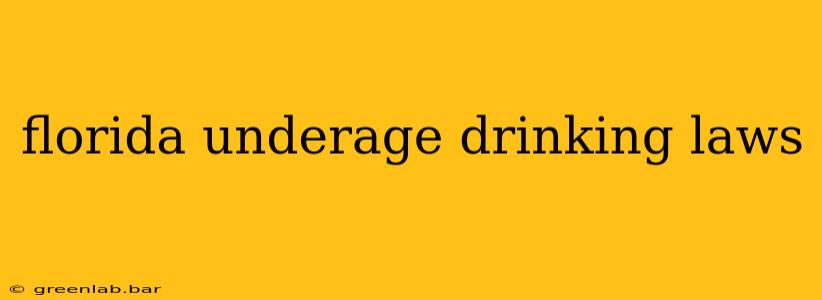Florida's underage drinking laws are strict, carrying significant consequences for both minors and adults who provide alcohol to them. Understanding these laws is crucial for parents seeking to protect their children and for teens hoping to avoid legal trouble. This guide provides a comprehensive overview of Florida's underage drinking statutes, penalties, and resources for help.
What is the Legal Drinking Age in Florida?
The legal drinking age in Florida, like in all U.S. states, is 21 years old. This means it's illegal for anyone under the age of 21 to purchase, possess, or consume alcoholic beverages. This applies to all types of alcohol, including beer, wine, and liquor.
Penalties for Underage Drinking in Florida
The penalties for underage drinking in Florida vary depending on the specific offense and the individual's prior record. However, they can be severe and include:
-
Minor in Possession (MIP): This is a first-degree misdemeanor, punishable by up to one year in jail, a fine of up to $1,000, and court costs. A conviction can also lead to a driver's license suspension.
-
Possession of Alcohol by a Minor: This offense mirrors MIP but may include additional penalties depending on the circumstances, such as the quantity of alcohol possessed or any associated disorderly conduct.
-
Public Intoxication (Underage): Being intoxicated in public while underage can result in fines, jail time, and community service. This offense often compounds the penalties of an MIP charge.
-
Furnishing Alcohol to a Minor: Adults who provide alcohol to minors face serious consequences. This is a first-degree misdemeanor, carrying similar penalties to MIP charges, and can result in more significant fines and jail time. The severity of the penalty is amplified if the minor subsequently suffers harm due to alcohol consumption.
Consequences Beyond Legal Penalties
The consequences of underage drinking extend far beyond legal penalties. These include:
-
Health Risks: Alcohol consumption before the brain is fully developed can lead to long-term health problems, including brain damage, alcohol dependence, and liver disease.
-
Academic Problems: Underage drinking can negatively impact academic performance, leading to lower grades, suspension, and expulsion from school.
-
Social and Emotional Consequences: Underage drinking can contribute to risky behaviors, relationship problems, and mental health issues.
What Parents Should Know
Parents play a vital role in preventing underage drinking. Open communication with teens, setting clear expectations, and providing support are key. Consider:
-
Open Communication: Talk to your children about the dangers of underage drinking and the legal consequences.
-
Setting Clear Expectations: Establish clear rules and consequences for underage drinking within the household.
-
Monitoring Activities: Be aware of your children's activities and social circles.
-
Seeking Help: If you're concerned about your child's drinking habits, seek professional help. Resources are available to assist families in addressing these issues.
Resources for Help
Several resources are available to help parents and teens deal with underage drinking:
-
Florida Department of Highway Safety and Motor Vehicles (FLHSMV): The FLHSMV offers information on Florida's driving laws, including those related to underage drinking and driving.
-
Substance Abuse and Mental Health Services Administration (SAMHSA): SAMHSA provides a national helpline and resources for substance abuse treatment and prevention. You can reach SAMHSA's National Helpline at 1-800-662-HELP (4357).
-
Local Community Resources: Many communities offer support groups and counseling services for families dealing with underage drinking. Contact your local health department or school for information.
Understanding Florida's underage drinking laws and the potential consequences is crucial for creating a safe environment for both teens and the broader community. Open communication, proactive measures, and access to support resources are essential in addressing this issue effectively.

